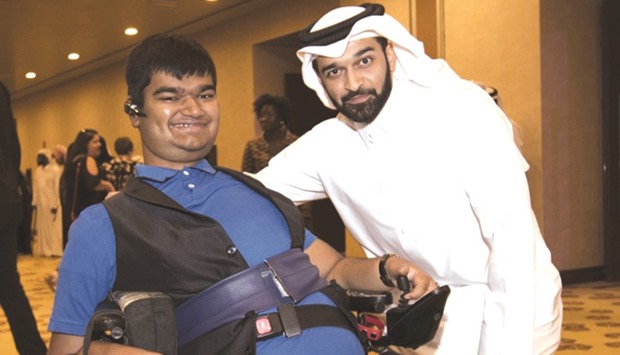The Supreme Committee for Delivery & Legacy (SC) launched its first Accessibility Forum in Doha yesterday.
The initiative will regularly bring together private organisations, NGOs, government representatives and people with disabilities in Qatar to discuss what needs to be done to ensure a seamless fan experience is delivered for people with disabilities attending the 2022 FIFA World Cup Qatar.
The first forum was attended by stakeholders charged with delivering infrastructure and services required for the tournament, including the Ministry of Transport and Communications (MoTC), Ministry of Public Health (MoPH), Ministry of Municipality and Environment (MoME), Ashghal, Qatar Rail, Hamad International Airport (HIA), Sasol Qatar, Qatar Tourism Authority (QTA) and the SC.
It was also attended by the Arab Blind Federation and representatives from the Physical Medicine and Rehabilitation Department at Rumailah Hospital of Hamad Medical Corporation.
The Accessibility Forum will act as an independent consultation group that will advise the SC and its stakeholders on specific disability requirements to ensure the 2022 FIFA World Cup Qatar is the most accessible and inclusive tournament ever, leaving a lasting legacy for people with disabilities in the country.
Forum members, who will meet three times a year for small focus groups and thematic information sessions, will discuss issues with stadiums, hotels and public spaces linked to the 2022 tournament and make recommendations that will be assessed and implemented across a variety of projects.After opening remarks at the inaugural forum from SC secretary general Hassan al-Thawadi, representatives from MoTC, MoPH and a number of other key stakeholders involved in the delivery of the 2022 FIFA World Cup gave presentations.
These included Eid Hamad al-Qahtani (SC project manager, Qatar Foundation Stadium), Noora Ali al-Suwaidi (team leader, Qatar National Master Plan), Abdulaziz Saleh Alyafei (senior project engineer, MoTC) and Dr Wafa al-Yazeedi (chairperson, Physical Medicine and Rehabilitation Department, Rumailah Hospital).
Dr Khalid al-Naemi, president of the Arab Blind Federation, also moderated a panel discussion and Q&A session with the SC, Ashghal, Qatar Rail, HIA and QTA. After listening to the presentations and participating in the panel discussion and Q&A, forum members in the audience were tasked with identifying five key priorities that they wish to see addressed by the stakeholders in attendance.
The five priorities that came from the first forum were as follows: Adopting the masterplan criteria guide for people with disabilities in buildings and installations – MoME; Adopting the motor disability guide on how to use public transport from and to the airport – MoTC; Training airport and hotel personnel on ways to deal with the disabled community in general – HIA and QTA; Integrating people with disabilities in the Volunteer Programme of 2022 FIFA World Cup – SC; Setting up a mechanism to involve the disabled community in the planning and implementation of projects by the participants in the forum through workshops to be held all year long – all participants in the forum.
Over the next 12 months, the SC and other stakeholders involved will assess the recommendations from the inaugural Accessibility Forum. This is to be followed by a meeting in 12 months’ time where the stakeholders involved will update the forum members on progress against the five recommendations and update on how they have helped shape policy and procedural matters connected to their specific projects.
SC community engagement manager, Khalid al-Jumaily, highlighted that the goal is to ensure that everyone attending the World Cup in six years’ time has a truly seamless fan experience, whether that’s entering stadiums, staying at hotels or enjoying Qatar’s public spaces.
Dr Salih Ali al-Marri, assistant general secretary, MoPH, pointed out that Qatar has gone a long way in enabling people with special needs. “This was evident in the vision I presented at the ninth session of the Conference of States Parties to the Convention on the Rights of Persons with Disabilities in June 2016.”
Al-Qahtani stressed that the built environment should be barrier-free and adapted to fulfil the needs of all people equally.
Accessibility Forum members represent individuals with different types of visible and invisible disabilities, ranging from physical (visual, speech, hearing, deaf, brain injury, use of a wheel chair); cognitive (intellectual impairments); perceptual (learning disability) and mental health disabilities. Other members, who may not have disabilities, come from organisations representing disabled people across Qatar and the region.
They have been selected on the basis of the nature of their work, their experience, availability, expertise and interest in participating in accessibility and community matters related to the 2022 FIFA World Cup.

Al-Thawadi with a member of the Accessibility Forum at the meeting yesterday.
